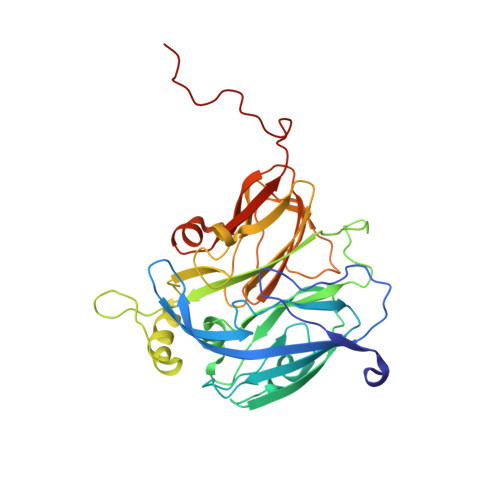An unprecedented dioxygen species revealed by serial femtosecond rotation crystallography in copper nitrite reductase.
Halsted, T.P., Yamashita, K., Hirata, K., Ago, H., Ueno, G., Tosha, T., Eady, R.R., Antonyuk, S.V., Yamamoto, M., Hasnain, S.S.(2018) IUCrJ 5: 22-31
- PubMed: 29354268
- DOI: https://doi.org/10.1107/S2052252517016128
- Primary Citation of Related Structures:
5ONX, 5ONY - PubMed Abstract:
Synchrotron-based X-ray structural studies of ligand-bound enzymes are powerful tools to further our understanding of reaction mechanisms. For redox enzymes, it is necessary to study both the oxidized and reduced active sites to fully elucidate the reaction, an objective that is complicated by potential X-ray photoreduction. In the presence of the substrate, this can be exploited to construct a structural movie of the events associated with catalysis. Using the newly developed approach of serial femtosecond rotation crystallography (SF-ROX), an X-ray damage-free structure of the as-isolated copper nitrite reductase (CuNiR) was visualized. The sub-10 fs X-ray pulse length from the SACLA X-ray free-electron laser allowed diffraction data to be collected to 1.6 Å resolution in a 'time-frozen' state. The extremely short duration of the X-ray pulses ensures the capture of data prior to the onset of radiation-induced changes, including radiolysis. Unexpectedly, an O 2 ligand was identified bound to the T2Cu in a brand-new binding mode for a diatomic ligand in CuNiRs. The observation of O 2 in a time-frozen structure of the as-isolated oxidized enzyme provides long-awaited clear-cut evidence for the mode of O 2 binding in CuNiRs. This provides an insight into how CuNiR from Alcaligenes xylosoxidans can function as an oxidase, reducing O 2 to H 2 O 2 , or as a superoxide dismutase (SOD) since it was shown to have ∼56% of the dismutase activity of the bovine SOD enzyme some two decades ago.
Organizational Affiliation:
Molecular Biophysics Group, Institute of Integrative Biology, Faculty of Health and Life Sciences, University of Liverpool, Liverpool L69 7ZB, England.


















